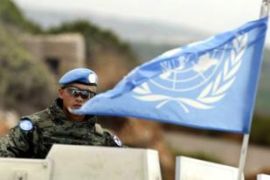Fears over Lebanon confrontations
UN officials “very concerned” at tensions between residents and peacekeepers in south.

On Saturday, a Unifil patrol was pelted with rocks by villagers, who seized the peacekeepers’ weapons and injured their patrol leader.
The clash came two days after Michael Williams, the UN special co-ordinator for Lebanon, said he was “very concerned” by a recent pattern of similar incidents.
“Some of these may have been something spontaneous in the street, but some were clearly organised,” Williams said on Thursday, as Lebanese newspapers described an “explosion of protest” over the past fortnight.
Hezbollah is well-supported in southern Lebanon and analysts believe that the confrontations could indicate that the group is unhappy with recent military exercises carried out by the UN force, which is mandated by security council resolution 1701 to stop the flow of weapons into southern Lebanon.
In an assessment of how the mission was going, Ban Ki-moon, the UN secretary-general, said on Friday that claims from Israel that Hezbollah has obtained scud missiles had “increased tension” in the region.
Pressure building
Elias Hanna, a retired general in the Lebanese army, told Al Jazeera that Hezbollah is feeling both international and local pressure.
“Hezbollah feel that there is a lot of pressure on them. Israel is really spying on them at the micro-level following the 2006 war,” he said, adding that the UN force in the Hezbollah’s heartland is seen as an “unwelcome guest” by the group.
| IN depth | |||||||||||||||||||
|
“The situation in 2006 obliged Hezbollah to accept Unifil, but Unifil is helping to achieve what the Israelis want,” he said.
“If you implement 1701 word for word, it means you are denying Hezbollah the ability to act. It means you are choking Hezbollah. They will not allow it.”
The Shia group, which is credited with ending Israel’s occupation of southern Lebanon and claimed a ‘divine victory’ over their arch-foe in the 2006 war, enjoys huge support in the area.
Hezbollah officials could have given the nod for residents to challenge the authority of peacekeepers, Timur Goksel, a former Unifil staffer with more than two decades of experience in south Lebanon, said.
“If for any reason Hezbollah have a gripe against the UN, they can easily mention it and local people will take action. It gives Hezbollah plausible deniability,” he told Al Jazeera.
But he said it was unclear what exactly was behind the recent incidents.
“It’s difficult to read. Maybe they feel a threat from exercises in that area,” he said.
“Unifil’s actions could have been misinterpreted by Hezbollah and its very easy for them to motivate the local people to react like this.”
‘Regular activity’
Unifil have said that the exercises are “regular activity” with no special operations and that the Lebanese army had been fully informed.
But the government in Beirut said in a statement that the peacekeepers
should co-ordinate with the Lebanese military and “execute all exercises in collaboration with the army.”
Hezbollah has denied being behind the unrest, but in an interview with the As-Safir newspaper on Friday, Naim Qassem, the group’s deputy leader, described Unifil’s recent exercises as “suspicious”.
He said that the peacekeeping force should “pay attention to what they do, and be aware that excesses cause concern,” to the local population.
“What they have done lately has worried the people,” he said.
Meanwhile, Mohammed Raad, a Hezbollah MP, insisted that people in southern Lebanon “do not have a negative attitude” towards the peacekeepers, and have proven “they can live with those forces” in the area.
